In ancient India, a king named Harischandra ruled over Kosala kingdom. This kingdom exemplified the adage: yathaa raajaa tathaa prajaah, which means: as the king, so are the subjects. The people of the kingdom were virtuous: they avoided anything evil; they did not drink nor did they gamble; they were not arrogant of their wealth; they were truthful and just in their dealings. As as result of these virtues, there was no famine, sickness or untimely death in the kingdom. People were healthy and strong; women were beautiful, cultured and all the people looked upon their king as their father and the queen as their mother. In an extraordinary quirk of fate, the very virtues brought trouble to the king and the kingdom.
Vasishta was the family priest of the king. He got into a dispute with sage Visvamitra on the possibility of finding a man of incorruptible virtue. Viswamitra contended that this was impossible; even a virtuous person can fail if put to rigorous tests. Vasishta's argument was that while Viswamitra had a point in general terms, there were indeed exceptional men in the world who cannot be tempted to give up their virtue. He cited Harischandra as one such man. Viswamitra laughed and said that Vasishta seemed to be carried away because Harischandra was the latter's patron. Viswamitra challenged that he will put Harischandra to such a rigorous testing that Vasishta would be proved wrong. Both the sages agreed to conduct the experiment with gods as witnesses.
Viswamitra forthwith proceeded to the capital of Harischandra's kingdom, Ayodhya and learnt that the king was proceeding on a hunting expedition. Viswamitra went ahead of the king and sat down in tapas in a wayside ashram. As the king's hunting party passed by, the sage created an illusion of female voices crying, 'O save us, save us from this man." The king replied, "I am coming to help. I will pierce with my arrows, the wretch molesting women" and ran towards the direction from which the cries were heard. The sage's tapas was disturbed with all the commotion. The king prostrated before the sage and apologized to him for the disturbance caused offering his kingdom and his wealth in reparation.
"What? Are these meaningless words?" Viswamitra questioned angrily.
"O Sage, I speak with all sincerity. I will keep my word."
"I take you at your word, then," responded the sage, "You are already indebted to me; you owe me the fees for the Rajasuya sacrifice which I had asked you to hold in trust for me."
"I will pay the fees whenever you demand, O Viswamitra."
"Okay; get back to your capital and arrange to hand over your kingdom and all your wealth."
Viswamitra held Harischandra to his words and went the next day to gain control of the kingdom and all the palace wealth. Harischandra gave up all that and also the ornaments of his queen.
"O sage, what more should I give you/"
"Who is the king of Kosala now," roared Viswamitra.
"Viswamitra," echoed Harischandra.
"Listen to my royal command, " repled Viswamitra, "You should leave my kingdom immediately with your wife only with the clothes you are wearing."
Harischandra observed with utmost devotion, "Your command will be obeyed." Accompanied by his wife, Chandramati and their boy Rohita, Harischandra started leaving the capital.
"Before you go, Harischandra, you have to pay me the fees for the Rajasuya which you owe me and which I had entrusted to you."
"I have now nothing which I call my own, except the clothing you have permitted me to retain. Please give me time to discharge the debt I owe you. In a month, I will pay back the sum."
"I agree; a month from now, I will come to collect the fees."
Harischandra took leave of his creditor amidst the cries of his subjects who got wind of the actions of the truthful king, "O king, how can a casually uttered word bind you? Your virtue is ruining us all. You cannot desert us. We will come with you."
Harischandra exhorted his subjects that their duty was to serve the new king. The troubles he had to face were of his own making and the subjects should not suffer on this account. Their new king was a royal sage, famous and possessed of marvellous powers. The new king's actions were prompted by some divine providence, which was inscrutable. It was the duty of the subjects never to swerve from virtue and the path of righteousness.
Viswamitra commanded his troops to tell Harischandra to stop this wasteful exhortation and to proceed forthwith out of the kingdom. Harischandra at once stopped talking and left the capital with his wife and son.
The threesome had to beg for their foot at the Dharmasalas on the way and to do manual work to earn their livelihood. They proceeded towards Kashi to wash away their sons in the sacred waters of the Ganga. As they entered the gates of the holy city of Kashi, Viswamitra was there to encounter them, "This is just to remind you: today is the day when you should repay the debt you owed me." Harischandra counted the days and realized that Viswamitra spoke the truth. Though dismayed, he immediately gained his courage and said to himself that he still had half-a-day before him during which time he should try to earn to repay the debt. Viswamitra said, "If you tell me that you would not pay me or even say that you do not owe me anything, I will not bother you any more. I can write off the debt." Harischandra replied vehemently, "O Sage, it is a fact that I owe you Rajasuya sacrifice fees. I will try to pay you before the end of the day."
The sage departed leaving Harischandra to work out a strategy. He set to thinking of ways he can raise money: What if I sell myself as a slave to some rich merchant and discharge the sage's debt? Oh no, what will happen to his wife and his son if he parted from them? Chandramati suggested that she and her son could be sold instead so that Harischandra could repay the debt, earn some livelihood later and buy them back.
Harischandra saw the strength of Chandramati's arguments. He took the wife and son to the market-place of the city and loudly announced, choking with tears, that his son and wife were for sale. A brahman came to him and said that his young wife needed the services of a servant-maid and offered to by only Chandramati and said that he had no use for the boy. Chandramati pleaded with the brahman that she would teach her son to do menial work and make him useful in the master's household. Finally the deal was struck, the brahman bought both of them paying a small additional sum and took them to his house.
Instantly, Viswamitra appeared. Harischandra paid him the the entire amount which he had received from the brahman.
"This is not even half of what you owe me," noted Viswamitra, in anger.
"True, Sage. I will give you the balance in a short time," implored Harischandra.
"The day is coming to a close; you have not kept your promise. I see you are a promise-breaker. Just tell me you owe me nothing, I will set you free of your debt."
"I deserve your anger, Sage. I do owe you money and I have to discharge your debt. I have just sold my wife and my son and repayed your debt in part. Please give me one more hour, just before sunset; I will try to sell myself and repay your debt in full."
"How many times should I be coming to you? Anyway, it is only one hour before sunset. Let me see." So saying, the angry creditor sage went away.
Harischandra returned to the market and starting crying aloud to everyone's hearing: "I am available as a slave to be bought with money, while the sun is still shining in the west."
Nobody was prepared to pay the price he was quoting. An executioner, the head of the local cemetery stepped up to take a deep look at Harischandra. He was fould-smelling, disfigured, uncouth, with a long, repulsive face, projecting teeth and a beard, dark-complexioned, pendulous belly, tawny eyes. He carried some birds, he had a skull in his hand and adorned himself with the garlands taken from the corpses. He was surrounded by a pack of dogs and was heard cursing in harsh tones. He also a carried a long staff. In sum, his appearance created fear and was repulsive.
"Who are you?" asked Harischandra when the cemetery-keeper offered to buy him.
"My name is Pravira, an expert executioner of the city. I am the guard of the cemetery at the south-western end of the city. My job is to despatch those who are condemned to death, to gather clothes of the dead brought to my cemetery."
Harischandra was wondering if he should accept to be the slave of Pravira. Viswamitra appeared on the scene and prodded, "Why are you hesitant to be his slave when he is offering you money enough to repay my debt?"
Harischandra pleaded, "O Sage, make me your slave for the balance of the money I owe you. I will obey your commands. I belong to the race of solar ancestry among kings. Please save me from becoming a slave to a cemetery-keeper."
"Just tell me that you do not owwe me anything more and I will let you free as a free man."
"How can I say that? I still owe you money," Harischandra pointed out.
"So you want to be my slave?" asked the creditor.
"Yes, sir. I beg of you. Please take me as your slave," said the debtor Harischandra.
"I agree. Now that you are my slave, I discharge you from the debt. But I am selling you right now to this cemetery-keeper for the sum he has offered."
The executioner was happy that he got the slave he had bargained for. He paid the money to Viswamitra and led Harischandra away to his house near the cemetery.
Harischandra's job at the cemetery was to collect for his master the cemetery fees from those coming to bury or burn the dead and to gather the discarded clothes of the corpses.
"Stay on this burial ground night and day and watch out for the corpses to arrive. Collect the fees strictly from everyone. Divide the collection into six parts; one part is for the king, three parts are for me; two parts will be your wages. You are also to execute the criminals condemned to death."
Harischandra worked for 12 months in this job. He was loyal to his master. His appearance was slowly changing like his master; with dishevelled hair, shoddy beard, emaciated and with protruding bones from his chest. He heard the crackling sounds of the burning faggots on the funeral pyres and howling of the jackals. He was frequently reminding himself of his wife and son and would often join the lamenting funeral parties and join in the loud lamentations remembering the dead. He reassured himself that he had done the right thing to avoid being untruthful and to avoid being unfaithful. He reminded himself of his priest Vasishta's saying that Dharma was the only light that mortals had on earth and everything else was illusion caused by ajnaana (ignorance). He had to walk by this light wherever it led him. He had to do his duty by the light whether he was the king of solar ancestry or as the assistant keeper of the Varanasi cemetery. It was not for him to choose.
A year passed by. One night, a ragged and destitute woman brought to the burning ground her own arms the body of her son. He was a small boy. He had died of snake-bite. She had also brought with her a bundle of sticks for the funeral pyre. Harischandra demanded of her the prescribed fees for the cremation. She pleaded with him that she was a destitute and could not pay. Harischandra refused to prepare for the cremation. He said that he could exempt his own share but he had to collect at least the king's share and his master's share of the fees. He saw a little jewel of gold hanging from her neck, mostly hidden by her ragged clothes and suggested that this be sold to pay the reduced fees he was demanding. On hearing this, the woman started crying, "O gods, what sins have I committed that the sacred symbol of my marriage which till now was visible only to my husband should be seen my the cemetery assistant/"
Harischandra was startled. He peered into the face through the enveloping darkness and asked, "Who was your husband?" She replied, sobbing, "My husband was once a king, a cruel creditor had forced him to sell her and her their son in the market of Varanasi." Harischandra saw what he was upto and fell on the dead body, crying, "O Rohita, Rohita darling son, my son! I am your father here, come to me dear child. O my god what snake was it, what were you doing, how did it happen? O god, I can't bear this anymore."
It was indeed Chandramati, Harischandra's wife who had brought her son to the burning ground at the dead of night. They recognized each other and wept together, caressing the lifeless corpse of their son lying on their laps. They resolved not to outlive their child. They wanted to get into the pyre and put an end to their lives also. But then, the problem of the cremation of the boy had to be resolved. Harischandra had to collect his fees. He told Chandramati to get back to her master and beg of him the money needed for the cremation of the boy. Chandramati had no options, she had to leave the cemetery.
As she was returning home, groping through the darkness, a man with a small bundle in his hand accosted her, "Who are you? Why are you weeping? Why are you here in this dark hour of the night?" Chandramati related the story and asked the man to show her the way to the master's house. The man, hearing the heartrending story said, "You do not have to go all the way to your master's house. Take this bundle. It has some jewelw. You can use the jewels to pay the cremation fee." He thrust the bundle into her hands and ran away into the woods, in the darkness of the night. Chandramati was left alone in utter fright. She heard the oncoming sounds of horses' hoofs. Beams of penetrating light were also seen. They were the police of the city on horseback in pursuit of the thief who had burgled into a house, strangled a sleeping child and had stolen the jewels on the child's body. The police saw the woman with the bundle in her hands and thought that she was the thief. Her extreme poverty and ragged clothes made her look like a criminal in the eyes of the police.
She was taken prisoner and taken to the magistrate's court and a complaint was lodged against her. "Ogre, don't you have any children? How heartless can you be that you stole a child's jewels?" shouted the magistrate. Chandramati narrated her story and explained how the bundle had come to be in her hands. The magristrate did not believe her, "You are a murderer and a thief. Don't add another attribute of being a liar."
The magistrate condemned her to death before sunrise the next morning and she was led away to the chief executioner of the city. Harischandra was on vigil near the body of his son awaiting the arrival of his wife with the cremation fee. She was being led in chains to the block for being executed as a criminal. Harischandra saw this and could scarcely believe his eyes. He ran toward the place of execution. He was stopped on the way by a boy who brought the master's message: Pravira wanted Harischandra to at once fetch the axe and execute the criminal who was being led to the block. Harischandra was reeling under the impact of horror upon horror being heaped on him. He was rendered speechless, momentarily.
The execution had to go on. The orders of the master keeper of the cemetery were unequivocal and very clear. Harischandra brought the axe and proceeded to the place of execution. The guards read out the orders of the magistrate. It was not for Harischandra to question the orders nor to produce counter-evidence to prove the victim's innocence. He was only the slave of his master whose orders had to be carried out. Chandramati looked at Harischandra with a stony, cold stare. Her agony was too deep for tears. As though by mutual consent, the husband and wife refused to recognize each other, they didn'' say a word in the presence of the guards. They had to go through the final stages of their tragic lives and get on with it and meet on the other side of death.
Harischandra took the axe in both his hands, closed his eyes in speechless torment of prayer and started lifting the axe up over his head and as he was bringing down the axe, his hands were seized from behind by Viswamitra who had now appeared on the scene. Gods gathered aaround in heaven watching the ordeals of the king.
Viswamitra acknowledged his defeat to Vasishta and announced, "O Harischandra, your is now alive. You and your wife have a merited place in heaven by your adherence unswervingly to virtue in the most trying circumstances. All your troubles so far are merely illusion created by me."
Indra the king of the gods explained to Harischandra how his virtue was being put to test. He welcomed the couple to heaven and asked him to install the son on the throne of Kosala.
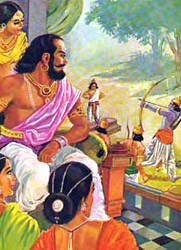 Dasaratha was famous for his miraculous ability to hunt blind and shooting arrows by hearing the sound only. Once during one of his hunting expeditions, Dasaratha heard a noise resembling elephant drinking water and shot an arrow in the direction in quest of his prey. But to his astonish Dasaratha noticed that he had instead shot an young boy named as Sravana Kumar who was collecting water in a pitcher for his blind parents. Sravanakumar was the only child of his parents and his parents were totally dependent on him. Sravana used to carry his parents everywhere on two pans of balance supported on his shoulder and collect water to quench their thirst.
Dasaratha was famous for his miraculous ability to hunt blind and shooting arrows by hearing the sound only. Once during one of his hunting expeditions, Dasaratha heard a noise resembling elephant drinking water and shot an arrow in the direction in quest of his prey. But to his astonish Dasaratha noticed that he had instead shot an young boy named as Sravana Kumar who was collecting water in a pitcher for his blind parents. Sravanakumar was the only child of his parents and his parents were totally dependent on him. Sravana used to carry his parents everywhere on two pans of balance supported on his shoulder and collect water to quench their thirst.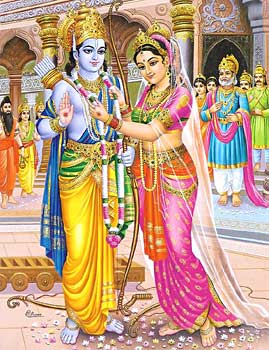 In Hindu mythology, Sita is the spouse of Rama the esteemed as an exemplarily of womanly and wifely virtue. She sprang from a furrow when king Janaka was plowing his field and Rama won her as his bride by bending Shiva`s bow.
In Hindu mythology, Sita is the spouse of Rama the esteemed as an exemplarily of womanly and wifely virtue. She sprang from a furrow when king Janaka was plowing his field and Rama won her as his bride by bending Shiva`s bow.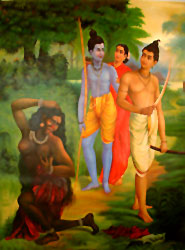 Rama asked her to approach his brother Lakshman. But Lakshman enjoyed teasing her and said that he was his brother`s servant. Hence, it would be better for Surpanakha to be Rama`s second wife rather than his first wife. Surpanakha became angry and made abusive remark about Sita. Lakshman could not control his rage and cut off Surpanakha`s nose and ears. In some versions of Ramayana, Lakshman cut Surpanakha`s breasts too.
Rama asked her to approach his brother Lakshman. But Lakshman enjoyed teasing her and said that he was his brother`s servant. Hence, it would be better for Surpanakha to be Rama`s second wife rather than his first wife. Surpanakha became angry and made abusive remark about Sita. Lakshman could not control his rage and cut off Surpanakha`s nose and ears. In some versions of Ramayana, Lakshman cut Surpanakha`s breasts too. In exile, Sugriva met Shri Rama, who was the avatar of Vishnu. Rama was searching for his wife Sita who was kidnapped and captivated by Ravana, the demon king of Lanka. Sugreeva joined Rama in quest of Sita. Rama promised in return that he would kill Vali and would re-enthrone Sugreeva as the king of Kishkindha.
In exile, Sugriva met Shri Rama, who was the avatar of Vishnu. Rama was searching for his wife Sita who was kidnapped and captivated by Ravana, the demon king of Lanka. Sugreeva joined Rama in quest of Sita. Rama promised in return that he would kill Vali and would re-enthrone Sugreeva as the king of Kishkindha.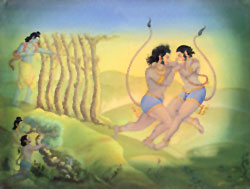 Sugreeva sent his most trusted companion Hanuman to find Sita. Hanuman returned with the news that Ravana, the demon king had captivated Sita in his island fortress of Lanka. When Rama decided to set for Lanka, Sugreeva also joined him along with his monkey-army to help him. When the army reached the seashore they built a special bridge across the sea to reach Lanka. The army also protected Rama in his citadel. After the great battle, Rama killed Ravana and Sita was liberated.
Sugreeva sent his most trusted companion Hanuman to find Sita. Hanuman returned with the news that Ravana, the demon king had captivated Sita in his island fortress of Lanka. When Rama decided to set for Lanka, Sugreeva also joined him along with his monkey-army to help him. When the army reached the seashore they built a special bridge across the sea to reach Lanka. The army also protected Rama in his citadel. After the great battle, Rama killed Ravana and Sita was liberated.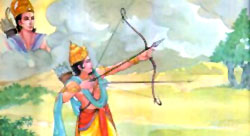 The Rishis could no longer bear the barbarities and prayed to King Rama to protect them by killing the demon. Rama put the responsibility of killing Lavanasura on Satrughna, who willingly accepted to go there and kill the terrible demon. Satrughna was a strong person and he had many good qualities including devotion and faith for Shri Rama.When Rama appointed Satrughna with the task of killing the demon, Satrughna touched Rama`s feet and asked Rama to put his grace on him so that he could destroy the enemy. Rama knew that Satrughna was a powerful person. So he smilingly blessed Satrughna and explained him the secrets of the weapon Trishula.
The Rishis could no longer bear the barbarities and prayed to King Rama to protect them by killing the demon. Rama put the responsibility of killing Lavanasura on Satrughna, who willingly accepted to go there and kill the terrible demon. Satrughna was a strong person and he had many good qualities including devotion and faith for Shri Rama.When Rama appointed Satrughna with the task of killing the demon, Satrughna touched Rama`s feet and asked Rama to put his grace on him so that he could destroy the enemy. Rama knew that Satrughna was a powerful person. So he smilingly blessed Satrughna and explained him the secrets of the weapon Trishula.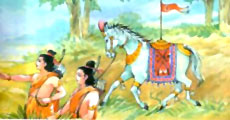 Satrughna obeyed Rama`s instruction and ruled the area for twelve years. He gave immense satisfaction to his subjects and protected the Sages as he ruled in an expert manner. After twelve years Satrughna could bear no more the separation from Rama and decided to return to Ayodhya. On his way back, Satrughna again spent the night in Valmiki`s ashrama. That time the two boys Lava and Kush were twelve years old and they sang beautifully the songs of Ramayana before Satrughna. Satrughna lost himself in joy and ecstasy. But he behaved in such a manner that they could not think that he was connected with them. Finally Satrughna returned to Ayodhya.
Satrughna obeyed Rama`s instruction and ruled the area for twelve years. He gave immense satisfaction to his subjects and protected the Sages as he ruled in an expert manner. After twelve years Satrughna could bear no more the separation from Rama and decided to return to Ayodhya. On his way back, Satrughna again spent the night in Valmiki`s ashrama. That time the two boys Lava and Kush were twelve years old and they sang beautifully the songs of Ramayana before Satrughna. Satrughna lost himself in joy and ecstasy. But he behaved in such a manner that they could not think that he was connected with them. Finally Satrughna returned to Ayodhya.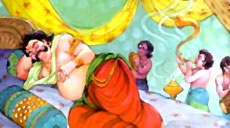 When Ravana was humiliated in the war with Rama he decided to seek his brother Kumbhakarna`s help. When Kumbhakarna was informed he was preparing to go for sleep. In the other version of the story Kumbhakarna was made awakened from the sleep with a great difficulty. However Kumbhakarna had no mood to fight. He tried to pursue Ravana to stop the war as he thought Ravana was wrong and was inviting unnecessary trouble by his useless insistence to marry Sita. He also advised Ravana to release Sita and put an end to the conflict with Rama.
When Ravana was humiliated in the war with Rama he decided to seek his brother Kumbhakarna`s help. When Kumbhakarna was informed he was preparing to go for sleep. In the other version of the story Kumbhakarna was made awakened from the sleep with a great difficulty. However Kumbhakarna had no mood to fight. He tried to pursue Ravana to stop the war as he thought Ravana was wrong and was inviting unnecessary trouble by his useless insistence to marry Sita. He also advised Ravana to release Sita and put an end to the conflict with Rama.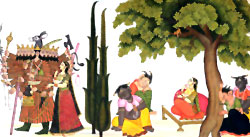 Though Ravana had many wives he always loved Mandodari most of all. Mandodari always remained Ravana`s favorite and most beloved. She always wished well for her husband and as she was a pious lady, she tried to bring Ravana in the path of piety. When Ravana captured Sita, Mandodari tried to convince him in a very humble way. She knew that Rama was not an ordinary man but was an incarnation of Lord Vishnu and Sita also was the part of Jagadjanani( mother of all goddess) Yogamaya. Mandodari tried to pursue Ravana so that he returned Sita and asked for Rama`s friendship. Ravana neither listened to Mandodari`s word nor he scolded her, as he knew that she always wished him good.
Though Ravana had many wives he always loved Mandodari most of all. Mandodari always remained Ravana`s favorite and most beloved. She always wished well for her husband and as she was a pious lady, she tried to bring Ravana in the path of piety. When Ravana captured Sita, Mandodari tried to convince him in a very humble way. She knew that Rama was not an ordinary man but was an incarnation of Lord Vishnu and Sita also was the part of Jagadjanani( mother of all goddess) Yogamaya. Mandodari tried to pursue Ravana so that he returned Sita and asked for Rama`s friendship. Ravana neither listened to Mandodari`s word nor he scolded her, as he knew that she always wished him good.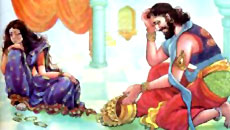 Just before the crowning ceremony Kaikeyi asked Dasaratha for the two boons he promised before. By one boon Kaikeyi asked to anoint her son Bharata in the throne of Ayodhya and for second boon she asked for Rama`s exile from Ayodhya for fourteen years. Dasaratha granted the boon to keep the truth of his promise but he died of a broken heart as he was separated from his dear son Rama.
Just before the crowning ceremony Kaikeyi asked Dasaratha for the two boons he promised before. By one boon Kaikeyi asked to anoint her son Bharata in the throne of Ayodhya and for second boon she asked for Rama`s exile from Ayodhya for fourteen years. Dasaratha granted the boon to keep the truth of his promise but he died of a broken heart as he was separated from his dear son Rama. When Indrajit got his victory over Indra, he was granted with a Brahmastra. It is believed that Brahmastra was a great weapon having tremendous power and when it left the bow it could beat any arrow and kill any person at wish.
When Indrajit got his victory over Indra, he was granted with a Brahmastra. It is believed that Brahmastra was a great weapon having tremendous power and when it left the bow it could beat any arrow and kill any person at wish.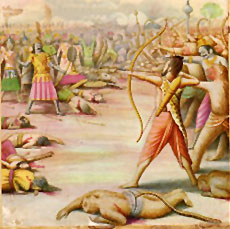
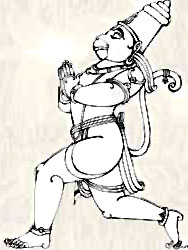 Angada led the Vanara team comprising of senior monkeys like Hanuman, Jambavan very efficiently. As a prince, Angada got loyalty and respect from other monkeys. But in some cases Vanaras gave in under stress and angada charged them up as the part of his duty.
Angada led the Vanara team comprising of senior monkeys like Hanuman, Jambavan very efficiently. As a prince, Angada got loyalty and respect from other monkeys. But in some cases Vanaras gave in under stress and angada charged them up as the part of his duty.